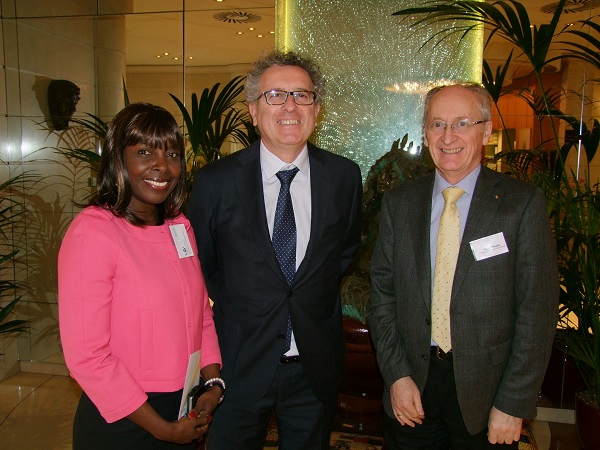
Luxembourg's Minister of Finance stated on Wednesday that for the Eurozone to work, member states need to adopt common macro-economic policies to support a common currency.
He said that of the Nordic countries, just Finland is a member of the Eurozone, yet all others keep in close contact with developments in Europe. He recalled a trip last year to Scandinavia and understands that Nordic banks in Luxembourg are reinforcing their presence here.
He addressed comments of the Eurozone potentially breaking up because of a weak link in the chain, e.g. Greece, and stated that such rumours were greatly exaggerated. Greece has received bailouts and he doubts a 4th bailout in the near future would be highly unlikely. He acknowledged that discussions of the future of the Eurozone were warranted. After what happened in 2008, it became obvious that some economies were adopting a common currency without common macro-economic policies; this he urged against and called for unity.
As a result, the coherence and rules of the Eurozone have been strengthened and discipline has increased. To increase banking stability in Europe, the Banking Union was created (a single mechanism, recapitalisation has taken place in certain cases, non-performing loans has been tightened, and the resolution fund has been created and subscribed with €55bn) - this fund now acts as a support as a common protection. He also mentioned the Deposit Guarantee Scheme, a type of reinsurance scheme which uses national credit lines.
While a lot has already happened, is the Eurozone ready to proceed and is it conductive to growth? One school of thought indicates that we have done more than enough, people are tired of readjusting, and we should stall on change; another perspective indicates that not enough has been done and more rules are needed, with the argument that some countries are not applying the rules as they should. He asked how can we change and reinforce the Eurozone without changing the treaties?
He stated that more fiscal policies are needed that are Eurozone-wide, despite not been able to have a "one-size-fits-all" implementation approach. He called for independent analysis of each country, yet unions and companies do not (yet) agree on how this could be implemented. Also, it is the EC's role to dictate such matters. Another concept is that of the European Fiscal Board which could also infringe on the powers of the EC. The key is to make implementations without changing treaties.
He said that the Luxembourg Presidency of the EU Council pushed through the new Protective Directive and the Securitisation Directive.
On Fiscal Union, the aim is to lower high deficits in certain countries, with strengthening of the political union to result in people becoming more involved in what the stability and growth package is all about. He said that social partners have a role to play too, to explain issues to their members.
The medium term seeks proposals to be tabled, with the Dutch Presidency monitoring what is happening in Greece and other countries. 2% growth in the Eurozone is foreseen in 2016 and debt reduction is foreseen across the Eurozone, including in Luxembourg.
For 2016, he identified the main concerns are hard lending of the Chinese economy, geo-political risks, emergency country risk and deflation in Europe and Japan; these are quite different from a year ago. Europe is standing taller and more robust than before.
On the issue of the attractiveness of Luxembourg and improved flight connections between Asia and Luxembourg, for the fund industry, etc., he said that some private flight companies and Luxembourg airport are looking at this issue right now.
On the potential Brexit, he said that Luxembourg would welcome to stay in the EU and called on other countries to be more flexible on the reform of the EU, unless it negatively impacts Luxembourg. While a Brexit could have a short-term advantage for Luxembourg, the long-term would not be so as other financial centres have inward-looking policies. On the future of the Schengen Agreement, he said that the people who are stating that the agreement has no future, are Europe-bashers. He said that the resulting problem of refugees is that refugees are coming from Africa, the Middle East and the Mediterranean, with civil unrest causing the migration of millions of people. He argued that if there was no Schengen Agreements, countries could turn to Greece and Italy and tell them to keep the refugees that come there first; he argues that this is not the Europe we want. He called for more financial means and resources to support the Schengen Agreement and the refugee crisis.
On Wednesday, Luxembourg's Minister of Finance, Pierre Gramegna, was guest speaker on the topic “Deepening of the economic and monetary union” at the Swedish and Nordic Chamber of Commerce in Luxembourg (Swebelux & Nobelux) held a New Year Lunch at the Hotel Parc Belair in Luxembourg city. He had been introduced by Michel Maquil
Minister Gramegna said that that afternoon he is traveling to Paris to sign an OECD agreement on finance, and will then be off to Milan for another event.
Photos by Geoff Thompson (above, L-R): Mathilde Hildenfeldt, Nobelux; Minister Pierre Gramegna; Michel Maquil, BCL & Nobelux









